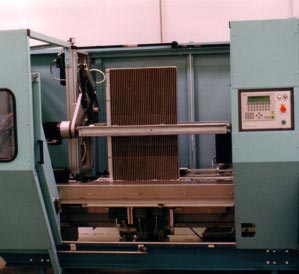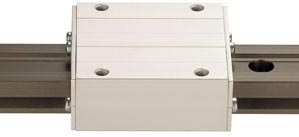Plastic instead of recirculating ball bearings
Linear guides for mechanical deburringIn the mechanical deburring of metal parts, high demands are posed on the drives and most notably on the guide elements of the milling motors. A high stiffening is demanded, and the guides should be designed for high feed rates. Purely theoretically, these are the ideal application conditions for recirculating ball bearing guides - if only there would be no high dirt and dust accumulation. A mechanical engineer therefore decided on plastic bearings - with success.
Both the main axles for the milling operation are provided with recirculating ball bearing linear guides. This also appears to be the right choice for high speeds. In the vertical guides for both the milling motors and the sawing unit, which simultaneously undertake the feed stroke of about 25 mm, things look however different. These guides are subject to exceedingly high loads as they must absorb the forces generated during milling, and "counterhold" accordingly. In addition the fast-running motors generate extremely high vibrations. Ultimately at this position, in the immediate vicinity of the machining, there arises high stressing through aluminum chips and dust. All these factors speak rather against the recirculating ball bearing guides. Therefore the designers at the engineering firm searched for an alternative solution. They decided on the DryLin® T polymer bearings from igus®. In the application with this bearing, a carriage with gliding elements made of abrasion-resistant high-performance polymer "iglidur® J" moves in a guide profile made of hard-anodized aluminum. This is a perfect tribiological pairing, as they have about three-fold higher abrasion resistance compared to steel gliding partners.

Automatic edge trimming machine for air intercooler.
Due to its excellent gliding properties, the system also has a low-noise operation; moreover it is insensitive to corrosion and dirt. The so-called "dry operation" is decisive for these properties. As the DryLin® T bearings manage without lubricants, the gliding elements act like wipers and very easily brush away chips and dust from the glide bar. Nevertheless it achieves excellent gliding properties due to the high-performance polymer iglidur® J. Lubricants are permanently integrated in this highly abrasion-resistant material developed by igus®. The linear guide DryLin® T is successfully used today, especially in dirty environments. For example, in wood machines, in the processing of paper and textiles, and in packaging machines. The linear guide stands its ground in environments with water, alkalis or acids, where most ball track systems clog.
This of course cannot be taken for granted, because the machines are subject to extreme stressing capacities. The guide units have to complete around 300,000 strokes per year - with vibrations, strong mechanical loads and in an environment that is constantly dirtied by aluminum chips and dust. Though a little wear would be absolutely natural, the DryLin® guides have operated even after three years and 900,000 strokes yet without any play of the bearing.

New DryLin® T "Heavy Duty" linear guide with gliding elements fixed in the lid.